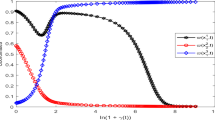Abstract
In this paper, we challenge the usual argument which says that competition is a fair mechanism because it ranks individuals according to their relative preferences between effort and leisure. This argument, we claim, is very insufficient as a justification of fairness in competition, and we show that it does not stand up to scrutiny once various dynamic aspects of competition are taken into account. Once the sequential unfolding of competition is taken into account, competition turns out to be unfair even if the usual fairness argument is upheld. We distinguish between two notions of fairness, which we call U-fairness, where ‘U’ stands for the ‘usual’ fairness notion, and S-fairness, where ‘S’ stands for the ‘sequential’ aspect of competition. The sequential unfairness of competition, we argue, comprises two usually neglected aspects connected with losses of freedom: first of all, there is an ‘eclipse’ of preferences in the sense that even perfectly calculating competitors do not carry out a trade-off between effort and ranking; and second, competitive dynamics leads to single-mindedness because the constraints on the competitors’ choices always operate in the sense of increased competitiveness and, therefore, in the direction of an increased effort requirements. We argue (1) that competition is S-unfair even if it is U-fair, (2) that as S-unfairness increases, the ethical relevance of U-fairness itself vanishes, so that (3) by focusing as they usually do on U-fairness alone, economists neglect a deeper aspect of unfairness.
Similar content being viewed by others
References
Arnsperger, Ch. and Ph. De Villé, La concurrence comme défi à l’éthique des affaires: Quand les relations sociales sont en jeu, Éthique Publique 1 (1999), pp. 32–41.
Arrow, K.J. and F. Hahn, General Competitive Analysis, San Francisco: Holden Day, 1971.
Aubert, N. and V. de Gaulejac, Le CoÛt de l’excellence, Paris: Éditions du Seuil, 1991.
De Villé, Ph., Time and Dynamics in Economics: The Lessons from General Equilibrium Theory, in B. H. Banathy (ed.), Systems Science and Science, Society for General Systems Research, Proceedings of the 24th North-American Meeting, Louisville: Systems Science Institute, 1980, pp. 260–265.
Debreu, G., Theory of Value. An Axiomatic Analysis of Economic Equilibrium, New Haven: Yale University Press, 1959.
Dejours, Ch., Souffrance en France: La banalisation de l’injustice sociale, Paris: Seuil, 1998.
Dejours, Ch., Travail, usure mentale: Essai de psychopathologie du travail, second edition, Paris: Bayard, 2000.
Dworkin, R., What is Equality? Part 2: Equality of Resources, Philosophy and Public Affairs 10 (1981), pp. 283–345.
Fisher, F., Disequilibrium Foundations of Equilibrium Economics, Cambridge: Cambridge University Press, 1983.
Fleurbaey, M., L’absence d’envie dans une problématique post-welfariste, Recherches Economiques de Louvain 60 (1994), pp. 9–41.
Fleurbaey, M., Three Solutions to the Compensation Problem, Journal of Economic Theory 65, (1995a), pp. 505–521.
Fleurbaey, M., Equal Opportunity or equal social outcome? Economics and Philosophy 11, (1995b), pp. 25–55.
Frank, R. H., and Ph. J. Cook, The Winner-Take-All Society, New York: Free Press, 1995.
Kolm, S.-Ch., Justice et équité, Paris: Éditions du CNRS, 1971.
Kolm, S.-Ch., Preface to the English translation of Kolm (1971), Cambridge, Mass.: MIT Press, 1998.
Lane, R., The Market Experience, Cambridge: Cambridge University Press, 1991.
Lazear, E. P. and S. Rosen, Rank-Order Tournaments as Optimum Labor Contracts, Journal of Political Economy 89 (1981), pp. 841–864.
Perilleux, Th., Les tensions de la flexibilité, Paris: Desclée de Brouwer, 2001.
Rawls, J., Social Unity and Primary Goods, in A. Sen and B. Williams (eds.), Utilitarianism and Beyond, Cambridge: Cambridge University Press (1982), pp. 159–185.
Schor, J., The Overworked American: The Unexpected Decline of Leisure, New York: HarperCollins, 1991.
Sennett, R., The Corrosion of Character: The Personal Consequences of Work in the New Capitalism, New York: Norton, 1998.
Author information
Authors and Affiliations
Corresponding author
Rights and permissions
About this article
Cite this article
Arnsperger, C., De Villé, P. Can Competition Ever be Fair? Challenging the Standard Prejudice. Ethic Theory Moral Prac 7, 433–451 (2004). https://doi.org/10.1007/s10677-004-3825-4
Issue Date:
DOI: https://doi.org/10.1007/s10677-004-3825-4




